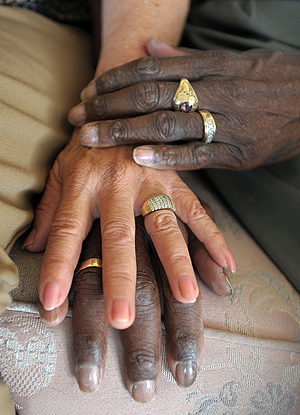Student’s research paper sparks opinions about interracial dating
March 13, 2012
var so = new SWFObject(‘http://www.staterinteractive.com/player.swf’,’mpl’,’665′,’450′,’9′);
so.addParam(‘allowscriptaccess’,’always’);
so.addParam(‘allowfullscreen’,’true’);
so.addParam(‘flashvars’,’&file=Interracial%20dating%202.flv&image=http://www.staterinteractive.com/photos/spring12/interracialdatingvid.jpg&frontcolor=6666FF&lightcolor=EEEEEE&skin=http://www.staterinteractive.com/snel.swf&streamer=rtmp://flashmedia.kent.edu/fms-jmc/kentWired’);
so.write(‘Interracial%20dating%202.flv’);
Forty-five years after the Supreme Court ruled interracial marriage bans unconstitutional throughout the United States, about 15 percent of new marriages in 2010 were between spouses of different races or ethnicities. This more than doubled the 1980 level of 6.7 percent, according to a Pew Research Center study.
When recent Kent State graduate Jessica Blair began her final paper for her qualitative methods class in December, she chose a topic she felt she could identify with. As the mother of a biracial child, Blair chose to uncover the problems interracial couples face in today’s society.
Blair, who graduated with a bachelor’s degree in conflict management last semester, attempted to form a focus group to further understand the experiences of interracial couples.
Blair said her plans to form the focus group fell through, but she was able to conduct interviews with seven interracial daters via email.
Blair’s 40-page analysis covered both her personal experiences with interracial dating and the experiences of her participants with a series of questions. The majority of her paper covered the reluctance of interracial daters to talk about their experiences. The respondents included four white females, two African American males and one Asian male.
“People have these attitudes that they want to be secret with how they feel about other ethnicities, and so there’s this idea that racism is dead,” Blair said. “I think anyone who dates interracially can probably tell you that this is not so.”
Blair said she often used Facebook to gather information for her research and received several responses to her posts that she considered incredibly racist.
One Facebook respondent, whom Blair referred to as ‘David,’ said in a comment he believed interracial families are unnatural.
“The shock on interracial children is terrible. Most of them have to break off one side of the family as the cultural differences are so big no one gets along,” ‘David’ said.
Blair said the biggest challenge of the paper was finding respondents.
“The most interesting part of attempting to find interracial daters to interview has been either the lack of response by interracial daters or the blatant racist responses,” Blair said in her paper. “When I first chose the topic, I did not think it would be so difficult to get people to talk.”
Blair said that during her time at Kent State, she felt that various cultures were not always accepted on campus.
“There’s definitely a problem with diversity at the school,” Blair said.
Sophomore theater major Jason Watkins has dated interracially in the past and is the son of an interracial couple. Watkins said he had very little issues regarding discrimination in his dating experience.
“I’ve seen issues that my parents have had within their relationships from people’s reactions, but I never really faced any problems with my own relationship,” Watkins said. “People have changed.”
Watkins said he does not believe that there is a problem on campus regarding race.
“I haven’t seen or experienced any problems,” Watkins said. “People are pretty accepting of different cultures and lifestyles here.”
Kent State sociology instructor Alex Briesacher said that although social movements of the past were somewhat successful in improving the lives of interracial daters, some discrimination remains in society.
“People don’t show hatred as much in public, which has definitely been a step in the right direction,” Briesacher said. “Those movements were successful in that way, but they don’t always change people’s minds.”
Briesacher said although racism is less clear in today’s society, it is still somewhat prevalent.
“People have this image of racism as if it’s still in the Jim Crow era,” Briesacher said. “The racism may not be as extreme, but the ideas from the past are still here.”
Alexandra Rodgers, sophomore nursing major, recently had her first interracial dating experience. She said it opened her eyes to ignorant thoughts she had held about relationships in the past.
“I wasn’t expecting it to happen,” Rodgers said. “My whole life I never thought of dating someone outside of my own race. When it happened, all the ignorant things that I had thought in the past just went away.”
Anthony Westbrook, sophomore photo illustration major, said he had been in a few interracial relationships and thinks race is becoming much less of an issue within society.
“Usually I get more curiosity from people because a lot of people aren’t familiar with dating outside their race, or it hasn’t presented itself to them,” Westbrook said. “For the most part, I don’t think our generation cares about race.”
Westbrook said whenever he’s experienced discrimination it’s been from older generations, and he has had issues with his father on the matter.
“Once the golden generation is gone, and we’re all in our 30s and 40s, I think there won’t even be a tag on interracial dating,” Westbrook said. “It will just be dating.”
Drew Parker is the diversity reporter for the Daily Kent Stater.
Contact Drew Parker at [email protected].












